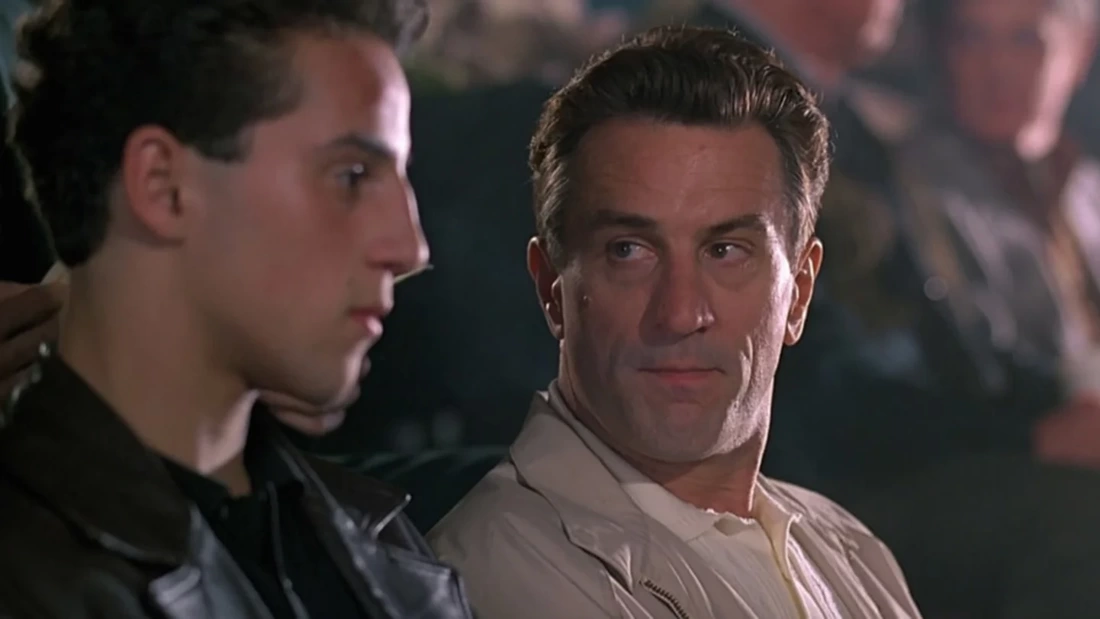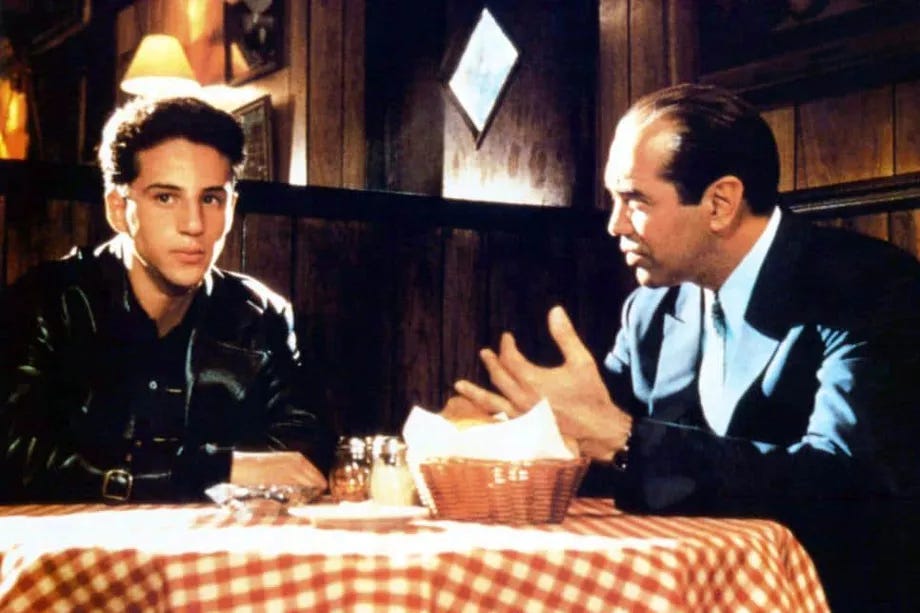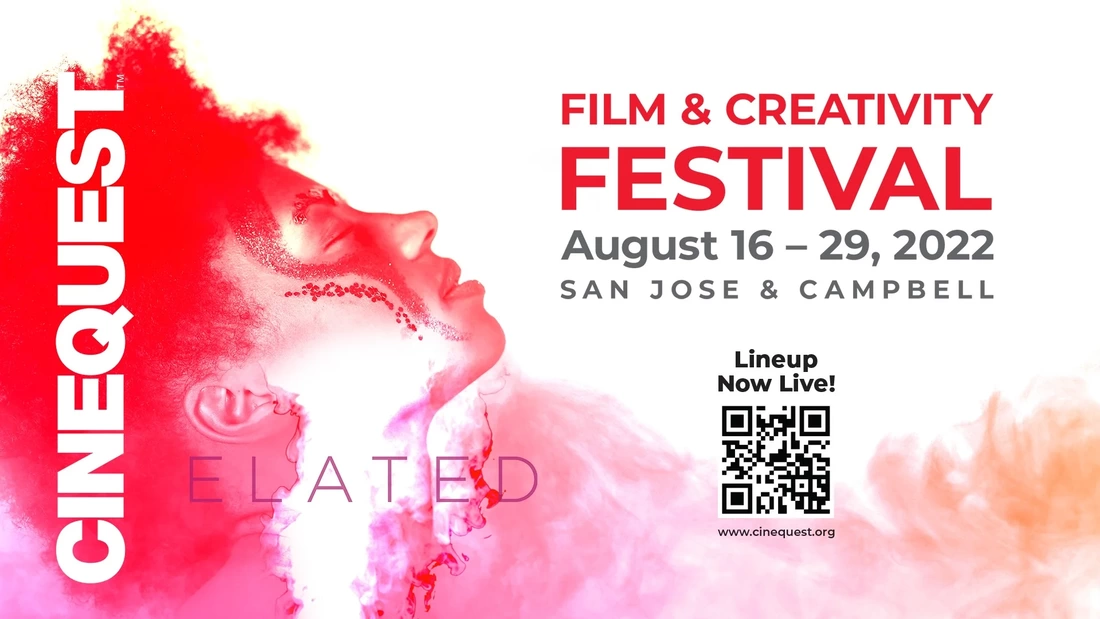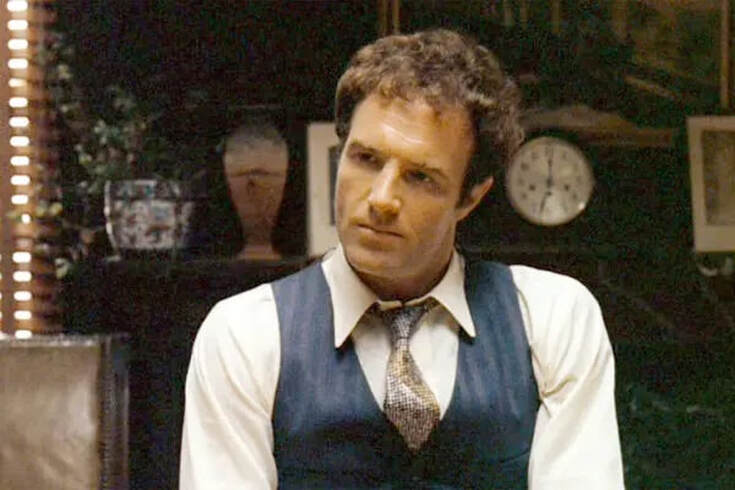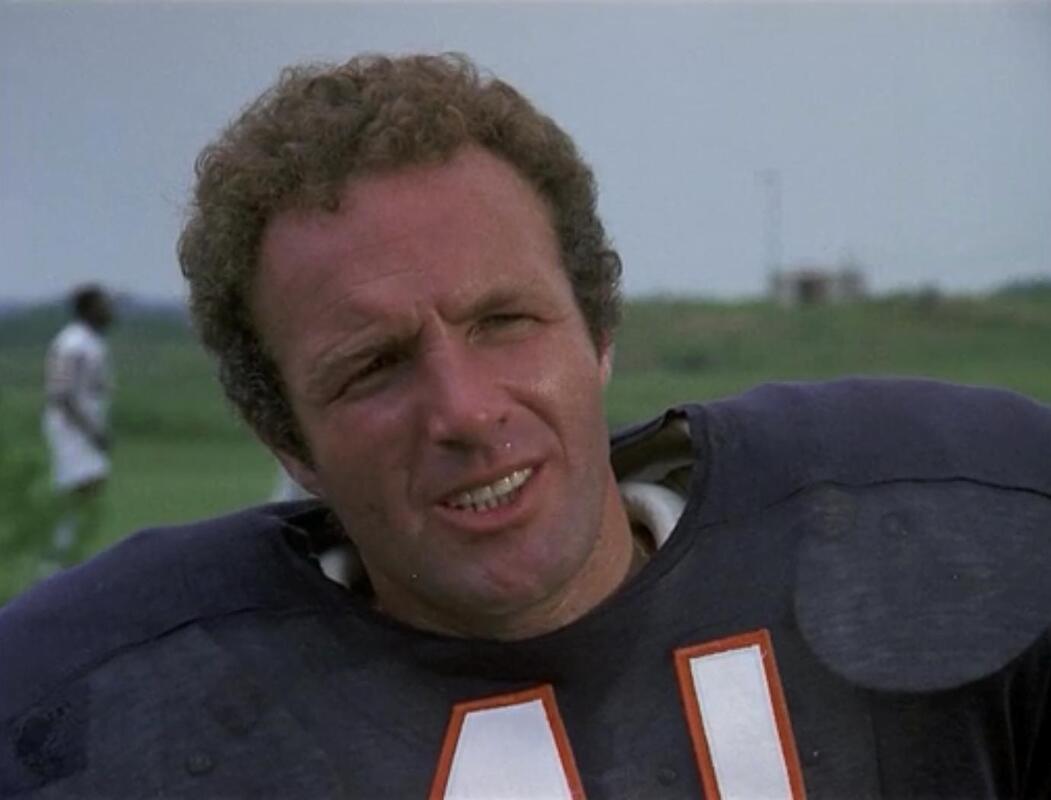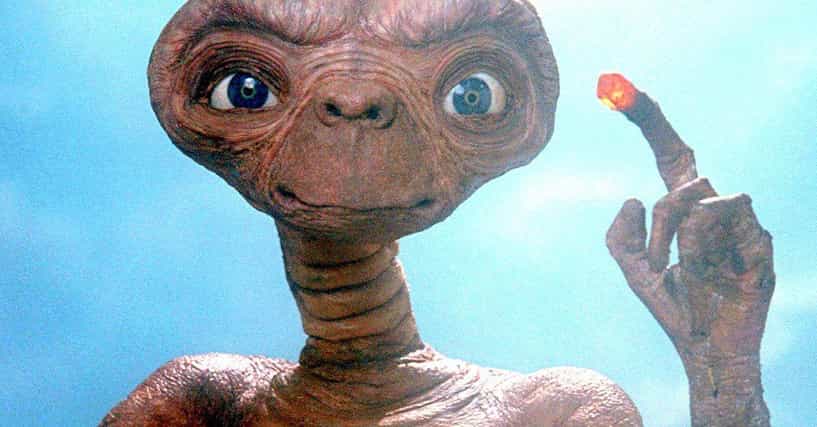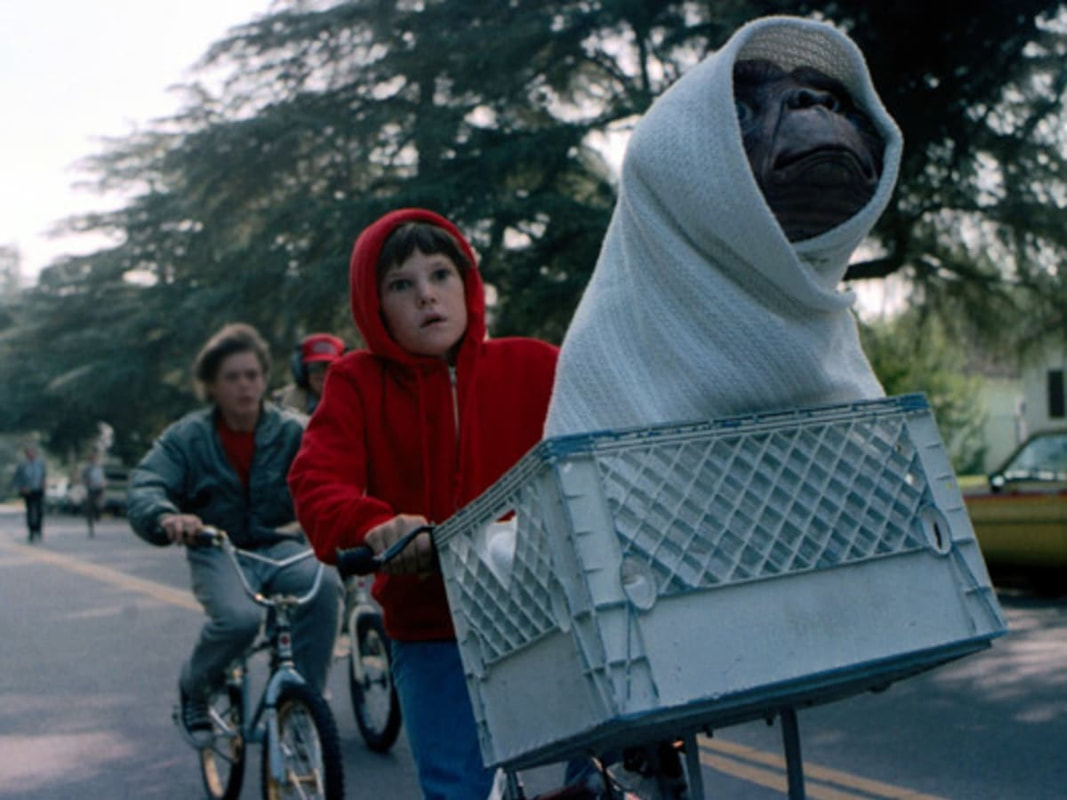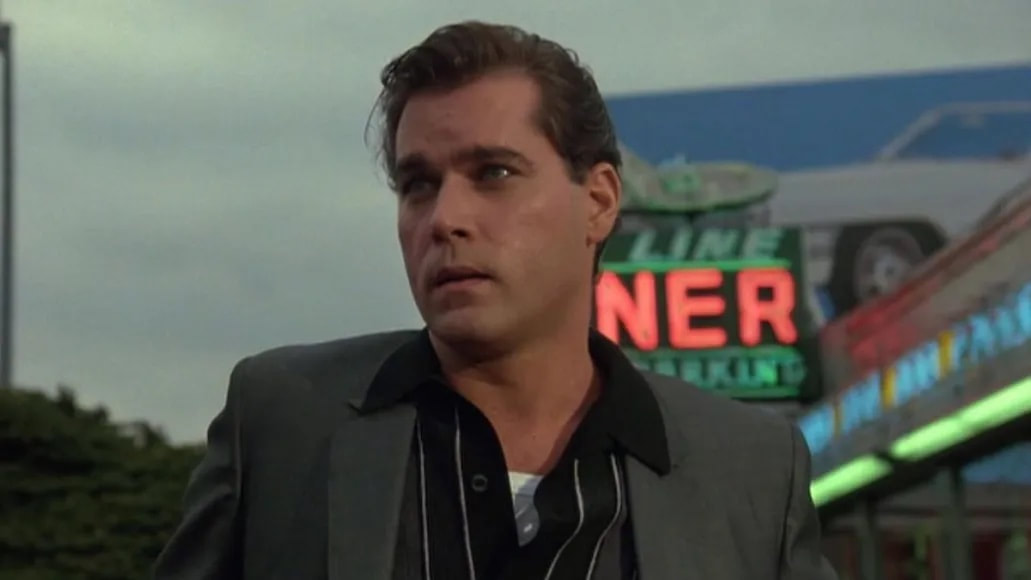|
By Dan Skip Allen Robert De Niro is one of the best actors in the world. He has been in all kinds of films — most famously in Martin Scorsese's films, such as Taxi Driver, Raging Bull, and a few gangster films like Mean Streets, Goodfellas, and Casino. He was also in The Godfather Part II as Young Vito Corleone. Occasionally he directs a movie once in a while. Go figure he would direct a gangster film, A Bronx Tale, the story based on the life of its other star Chazz Palminteri. Calogero "C" Anello (Lillo Brancato) is an impressionable young man who lives in the Bronx with his parents Rosina (Kathrine Narducci) and Lorenzo (Robert De Niro), who is a city bus driver. His father tries to bring him up as a stand-up guy, but he gets turned on by the local gangster in his neighborhood, Sonny (Chazz Palminteri). After he witnesses an incident in the neighborhood, he doesn't snitch out Sonny or his gang. This makes Sonny start to care about this kid and take him under his wing like he is one of his own. There is a code that Palminteri's character lives by, but the fact that he is going around the bar and driving Sonny's car around still gets his father upset. He doesn't want him involved with these guys because they're so-called “bad guys.” Lillo Brancato plays the character "C" for most of the film, and this dichotomy between his father and Palminteri's character is the crux of this story. He's in a difficult situation. This is what happened in Palminteri's life, which makes it all the more powerful to watch. A Bronx Tale is a lot like many other gangster pictures. It shows the lives of these wise guys and their families — similar in some ways to Goodfellas, but different in other ways. De Niro shows that the glamorous life of being a gangster isn't all it's cracked up to be. There are many dangers that go along with this lifestyle. This young man learns the hard way. He learned different things from both of these men in his life that he would use as he grew up. With this being a period piece, there are some aspects of the film that stand out in that regard. One of them is the music. The filmmakers were able to get some classic songs from various groups, like Frankie Valli and the Four Seasons, some Motown music from the Deons, and many other songs that fit the ‘60s when this story took place. Butch Barbella's score fits perfectly with these songs, and his song “The Streets of the Bronx.” The music all around was terrific in this movie.
With gangster films comes violence, and this movie has a lot of it — some racially motivated and others gangster related. The blood and violence, fires and beatings, were a way to show that there was more going on at this time than the young man realized. The racial tensions were palpable. Just riding through the wrong neighborhood could get you beat up or even killed. And this story shows what an eye for an eye is truly like. The ‘60s were the beginning of a more violent era in our country, and this film doesn't shy away from that fact. A Bronx Tale is celebrating its 30th anniversary this month. Although it's not put in the same category as Goodfellas, The Godfather films, or Scarface in terms of its greatness, it truly is a great cautionary tale of why the gangster lifestyle isn't all it's cracked up to be. I wanted to be a gangster when I was a kid, so this reminded me a lot of my childhood watching this film, thinking what a great life this would be. The family aspects, eating great Italian food and hanging out with your friends who were like brothers. Even the father figure was a man I could idolize because he was a hard-working man who drove a bus and didn't quit his job like my father did all the time. This is a great film no matter how you look at it, and I'm glad I got to revisit it for its 30th anniversary this week.
0 Comments
By Dan Skip Allen The Cinequest Film Festival champions filmmakers from different backgrounds with unique visions. Based out of San Francisco, the festival showcases films from all over the world. There are loads of narrative films, documentaries, and shorts, many of which deal with the human condition. After a couple years of virtual editions, the festival is returning to an in-person format from August 16-29. Here are some films playing in the festival that we recommend you check out! LinoleumLinoleum takes place in Fairview Heights, where the lead character Cameron Edwin (Jim Gaffigan) hosts a children's science show, a la Bill Nye the Science Guy, called "Above and Beyond." He is married to Erin (Rhea Seahorn, Better Call Saul), who sometimes helps him on the show but works at a science & space museum in town. They have a daughter named Nora (Kathryn Nacon) who goes to a private high school, but she doesn't fit in. She meets a boy in school, but he's the son of her father's rival. When a rocket lands in Gaffigan's backyard, he decides it's time for a change in his own life. This film is trying to say something about motherhood, parenting, and how parents interact with their children. It uses some weird ways to do this, but they work in an odd way. It wasn't easy to be a parent in the '80s or today, for that matter. Director Colin West creates a very existentialist film but uses the weird things going on in the movie to tell a straightforward story. You Resemble MeYou Resemble Me deals with two Sisters, Mariam and Hasma, that look alike. It's a French film, subtitled, but the girls and their families are Moroccan. Their mother is abusive, so the girls get out and run away. They live on the streets in Paris, France, but the girls get taken to child services. Each one is put into different separate homes. Hasma runs away from their foster parents and goes back home, but her mother doesn't want her anymore. Now she's an adult on her own, and she's struggling to make a life for herself, and she reaches out to her cousin, who's a terrorist in Syria, Films about terrorism aren't easy to digest. This film puts the viewer in the first person aspect of how a downtrodden life can lead to a life of terrorism. Terrorists prey on struggling Muslims to get them to do their bidding. This happens with any religion, though. Catholic, Protestant, or Baptist. They see weakness, loneliness, and anger and direct those emotions into getting their bidding. The writer/director Dina Amer captures this lifestyle perfectly. It's a shame that people are preyed on in this way. This film might not be for everybody, but it was an eye-opening look at how things that happened in this film come about. What We Do NextWhat We Do Next takes place in New York City, around Washington Heights, and follows an ensemble of characters. One of the lead characters is Sandy James (Karen Pittman), a city councilwoman and career politician. Another is Paul Fleming (Corey Stoll), a financier of 500 hundred dollars used to buy a gun. The third character is Elsa Mercado (Michelle Veintimilla), who murdered her father who was molesting her, and went to prison for 16 years but got out. Sandy and Paul try to help Elsa when she gets out, but there is a miscommunication involving what the money would be used for. It's not as a down payment for rent. Now she is blackmailing them for a job making 75,000 dollars a year. Stephen Belber shapes this film in seven parts, but it's more like a stage play than a movie. It's like a three-man play set in this area of New York. As a dramatic piece about politics and crime and punishment, it works perfectly. As a film, it drags, and the conversations seem at times like they are going nowhere until someone changes the subject or the stage changes to the next one. The acting is fine by all three leads, but I feel they forced the issue too much to be as effective as it could be. On a personal note, politicians can help family members in need after committing a crime, but it's not generally this dramatic. Velvet pushes the envelope a little too far for my liking. JuniperA young woman, Mack (Madison Lawlor), leaves home to spend time alone at a secluded cabin after her sister's death. Unexpectedly, her friend from childhood, Alex (Decker Sadowski), and her college roommate Dylan (Olivia Blue) show up to console her in a time of need. And then a couple of guys, one the brother of Alex, show up as well, making it five people at the cabin. The director Kathrine Dudas brings these people together so they can work out their differences and grieve in a way that's not normal for most people. The drama between the characters seems forced, and the acting doesn't seem genuine. The location is fine, but the overall execution of the story and characters seemed off. They didn't seem authentic, and neither did the entire situation. Freedom's PathA Union soldier, William (Garren Howell), gets scared off of war and decides to flee the fight. After an injury, he gets found by a young slave, Kitch (R.J. Cyler, Me and Earl and the Dying Girl), who brings him into his life and introduces him to his family. Inexplicably, they become friends. They are helping out on the Underground Railroad. First, they must avoid men trying to capture and kill them, led by Silas (Ewen Brenner). Kitch's grandmother Caddy (Carol Sutton), teaches them her ways about life and the kitchen.
Writer/Director Brett Smith captures the world of the 1800s South perfectly. It's no 12 Years a Slave, but it is an authentic, true look at the South during that time in our country. The cast is very good, and the cinematography is beautiful to look at. It's a shame people of different races can't seem to come together today to form a bond in hard times. Hopefully, more people will watch this film and see how life can change if you give someone different than you a chance. By Dan Skip Allen Many of these retrospectives on actors' lives have started with me talking about something I've seen in my childhood that I loved, which made me a big fan of a film, actor, or director. The same will go for Hollywood tough guy James Caan. The Godfather is in my Top 5 movies of all time, so I couldn't do a James Caan retrospective without bringing up "Sonny"/Santino Corleone, the first born son of Vito Corleone (Marlon Brando). He had a lot of fire and led the family differently than his father or younger brother, Michael (Al Pacino). His temper, especially toward his sister's husband in the film was legendary. He beat him to a pulp in that street scene. That was the mentality of Caan, though. That is just one of the many notable performances from Caan. He's had a long and storied career in Hollywood. Another role he is noted for is that of Paul Sheldon in Misery, an author with writer's block who has traveled to a secluded cabin to write his next novel in his popular series. Unfortunately for him, he gets into a near-fatal car accident on the slippery mountain roads on his way to get some supplies for his stay at the cabin. He gets rescued by an innocent bystander who happens to live nearby, Annie Wilkes (Kathy Bates). Bates won an Academy Award for her performance as this superfan turned kidnapper. Caan has to do everything he can to survive and escape this maniacal woman. This film showed Caan's range and put him in great company opposite Lauren Bacall, Richard Farnsworth, and the aforementioned Bates, who gave the best performance of her career opposite him. He played it a little more nuanced this time around. Caan also works opposite one of the world's foremost comedians and television stars in Elf. He had to play the straight man, as Buddy's father opposite Will Ferrell. Ferrell is at the height of his popularity as this elf looking for his father in the Big Apple. He's such a child that everybody around him, including Caan's Walter Hobbs character, is playing second fiddle to Ferrell. Like in Misery, Caan creates nuance and subtlety to make this character memorable. The rest of the cast, including Peter Dinklage and Zoey Deschanel, add some addition to the film that makes it even more fun than it already is. This is an instant Christmas classic, and Caan is a major part of that. In Caan's career, he played tough guys, innocent victims, and fathers who never knew they were a father of a man child, but he's also done a couple of football films that mean a lot to me. One I consider one of the best sports films ever, Brian's Song, a movie of the week where Caan plays Brian Piccolo opposite Billy Dee Williams as Gale Sayers. Both actors played football players who played for the Chicago Bears in the 1960s. Piccolo and Sayers were white and Black men in an era when segregation was still a thing, even in sports. They were symbols of what would become a norm in later decades. Both characters have various bouts of severe illness, and one was very tragic for Caan's Sayers. This film is amazing, and the performances between Caan and Williams are the main reason why.
In The Program, on the other hand, Caan plays a head coach, Sam Winters, of a college football team with all the cliche moments you'd think a football program would have: drug abuse, alcoholism, partying, and other criminal behaviors. This film was modeled after Florida State in the 90s and early 2000s, where Bobby Bowden had a great team, but his players weren't necessarily all on the up and up during their careers as college students/athletes. The student part seemed to go by the wayside, though. Caan played this coach with a manor of innocence towards his players while bringing the fire he was known for in his other films. He was cast perfectly as this coach with a championship goal despite the directives from his superiors at the school and his crazy and wild players. Caan's career is varied, and he's played all kinds of characters. He is most known for Sonny in The Godfather, but he has been around since the '60s with El Dorado, and his 70's career had a mix of interesting roles in Rollerball and The Gambler. The 80s brought Thief, directed by Michael Mann, where he played Frank, a jewel thief trying to do one last score before he retires. This is always the case with criminals, but it never ends the way they think it is supposed to. In Mickey Blue Eyes, he plays a gangster once again, opposite Hugh Grant, who's trying to marry his daughter. This is another comedic role for Caan, who mixed up his parts very nicely. His career has given fans plenty of great characters and memories that will endure for many years to come. I will never forget him and his career as long as I live. By Dan Skip Allen When I was a kid, my family sometimes didn't have enough money to eat, and we struggled to pay our bills. Even for an eight-year-old, I knew we were struggling financially. Every once in a while, we had enough money to do things together as a family. My brother, sister, and I would load into whatever car we had at the time, probably a station wagon, and go to the nearby drive-in theater. This was a big deal for us. Even a bigger deal was back in the summer of 1982; we did just that and got to see a film that helped transform me into the film aficionado I am today: E.T. the Extra-Terrestrial. E.T. wasn't just any film — it was a film that showed me what movies could really be for a child of eight years old. I remember as a kid that when E.T. and Elliot (Henry Thomas) road that BMX bike into the sky to escape men in black trying to get to them. It felt like they went right through the screen and into the air above the drive-in. It was a bit surreal to me at the time. I have held that memory with me ever since, and I'll never forget it. That famous line from the film uttered by an animatronic alien, E.T., will also be indelibly stuck in my brain forever. "E.T. Phone Home." Any kid or adult watching that film that didn't cry is just not human because I balled my eyes out when I watched it. Shows like Stranger Things have adopted a little of the nostalgia of what E.T. the Extra-Terrestrial is, but nothing will ever replace this film in the annals of history. I loved the cast, from Dee Wallace as the overprotective mother to Thomas Howell as the big brother and who couldn't forget little, at the time, Drew Barrymore as the sister who dressed E.T. up as a girl and fed him Reese's Pieces. Now Reese's Pieces are synonymous with this film. Peter Coyote played the secret agent trying to capture E.T., and he did as great as this character. He played a good villain at the time. Many people make a big deal about physical media editions of this film being altered because the guns were taken away, but no DVD, Blu-Ray, or 4K will ever take away what was etched in my memory as a child. At the time, the guns were necessary to help the story. I understand they may have been a bit overkill, but they worked in the context of the story. The producers and filmmakers made a tough choice, but I think it was right.
My second favorite filmmaker is Steven Spielberg. As a kid, I got to see Jaws, Close Encounters of the Third Kind, and Raiders of the Lost Ark, but my favorite of his films will always be E.T. the Extra-Terrestrial. He was able to bring something out in me no movie had ever done before: genuine emotion, from crying sadness to joyful happiness and, at times, anger. This film brought out every emotion in me as a child. That is what great filmmaking should be able to do. One of Spielberg's frequent collaborators is John Williams. At the time, he was the conductor of the Boston Pops. Another annual gathering for my family would be once again to load all the kids in the car, head to Boston, and get our spot on the grass at the Esplanade, where we would get to hear the Boston Pops perform for free every Fourth of July. And so I was very familiar with this man's work, but the E.T. theme was like magic to my ears, and it's still one of the most iconic themes of John Williams's career, in my opinion. On the week of the fortieth anniversary of E.T., I implore everyone young and old — if you've seen the film or not — to watch this absolute classic. Maybe it will bring you the emotions it brought me as an eight-year-old little boy looking for magic which I found on the big screen at that drive-in cinema. The cast, the filmmaker, and the composer brought me one of the most enjoyable cinematic experiences of my entire life, and I will never forget that moment in time. By Dan Skip Allen I loved watching sports movies and gangster films when I was a kid. They were two different kinds of movies, but they both had their own way of inspiring me growing up. Sports films put you in the shoes of those heroes on-screen, whether it be Roy Hobbs hitting massive home runs or Shoeless Joe Jackson coming out of the corn, saying, "Where are we? Heaven?" Sports films have an imagination that can make you dream of something greater than yourself. Gangster films have a glamour to them that gives me chills. In Goodfellas, Henry Hill cooks an Italian meal in prison with the Don. You have to cut the garlic very thin, so it melts with the olive oil. It was a great scene of camaraderie between brothers. Gangster films showed a world that was just perfect sometimes.
Ray Liotta was in both of these films. In one, he played a ghost of Shoeless Joe Jackson teaching and playing baseball; in the other, he was Henry Hill, a young and impressionable man looking for something to be a part of and belong to. Both characters showed Liotta had acting chops. Both characters brought something to the table regarding my favorite kinds of films: a Martin Scorsese classic and a baseball classic. They are movies I would recommend to anybody. Liotta is excellent in both of them. The scene where he was high on cocaine, driving all over town trying to deliver the guns, but he believes the feds are following him, is brilliant. He's so paranoid in this whole sequence. You feel the paranoia he feels while watching him. Liotta has had a vast career besides those two iconic roles in those great films. He's played a corrupt policeman in Copland, an FBI Agent caught in the middle of a bunch of hitmen in Smokin' Aces, a police chief caught in a hostage situation in John Q, and Aldo Moltisanti, the father of Christopher in The Many Saints of Newark, the prequel to The Sopranos. He's even been in Bee Movie starring Jerry Seinfeld. He pretty much did it all in his fifty or so years in film. When people think of two of the most iconic films of the last generation, they'll talk about Goodfellas and Field of Dreams. That's what I think of when I think of the great career of Ray Liotta. These two films will cement him as one of the greats of his generation. |
The Snake HoleRetrospectives, opinion pieces, awards commentary, personal essays, and any other type of article that isn't a traditional review or interview. Archives
June 2024
Categories
All
|
|
|
disappointment media
Dedicated to unique and diverse perspectives on cinema! |

